China Brands, Marketing & Consumers
Qiaobi’s “Horrible” and “Racist” Commercial Taken Down, Chinese Netizens Respond
The controversial Qiaobi laundry detergent commercial that shows a black man turning into a Chinese man after being ‘washed’ has been taken down by the company. The brand apologizes for the controversy, but many Chinese netizens are not satisfied.
Published
9 years agoon

The controversial Qiaobi laundry detergent commercial that shows a black man turning into a Chinese man after being ‘washed’ has been taken down by the company. The brand apologizes for the controversy, but many Chinese netizens are not satisfied.
Earlier this week, a Chinese commercial for laundry detergent caused big controversy when international media exposed how it depicts a black man turning Chinese after a girl puts him in the washing machine. Many media and netizens deemed the commercial “horrible” and “completely racist”.

Although the commercial initially did not receive much attention in China, the storm of criticism from outside the PRC eventually also sparked discussions on Chinese social media. Different websites soon exposed that the Chinese commercial was copied from a 2006 Italian ad where a white man turns into a black man after being ‘washed’.
On May 30, Chinese media reported that Qiaobi had taken the commercial down and had apologized in response to the outrage it caused.
Qiaobi is owned by mother company Shanghai Leishang Cosmetics (上海雷尚化妆品有限公司) that was established in 2009. A spokesperson for the company stated that the commercial was filmed in the beginning of 2016 and later, on March 31st, was published on Qiaobi’s official WeChat account.
The video has now been removed from the Qiaobi account. On the evening of May 28, the company issued an official apology on its Sina Weibo account, where it strongly denounced racism and said they regretted the commercial had caused so much controversy. They also stated they had “no intention of discriminating against people of color” by making the commercial.

Many Weibo netizens, however, blame Western media for pointing fingers and deem an apology unnecessary. “What are they apologizing for?” one netizen writes: “It was just a commercial. Western media are crazy.”
“Western media have just taken their concept of ‘racism’ and applied it [to this commercial]. In reality, the great majority of Chinese people have no notion of ‘white’ versus ‘black’ or ‘Asian’, and any supposed inferiority in this,” another commenter says.
Many Weibo netizens are also not satisfied with Qiaobi’s apology for another reason; because it there is no mention of the fact that the commercial was copied from the original Italian ad. “How come you don’t say anything about plagiarizing?” one of the top comments says.
“Your problem is plagiarism, not racism,” one Weibo user says.
But others disagree, writing: “You really made China lose face with this blatant racism, do you have no human understanding at all?!”
“It’s good that it’s removed, not just for the racism, but also because it is plagiarized – it makes China look bad,” one netizen writes.
– By Manya Koetse
Follow @WhatsOnWeibo
©2016 Whatsonweibo. All rights reserved. Do not reproduce our content without permission – you can contact us at info@whatsonweibo.com.
Manya is the founder and editor-in-chief of What's on Weibo, offering independent analysis of social trends, online media, and digital culture in China for over a decade. Subscribe to gain access to content, including the Weibo Watch newsletter, which provides deeper insights into the China trends that matter. More about Manya at manyakoetse.com or follow on X.

China Arts & Entertainment
Passing the Torch from ‘Ne Zha’ to ‘Nobody’: China’s Box Office Poster Relay Tradition
With China’s box office relay tradition, every movie’s success becomes a win for Chinese cinema.
Published
3 days agoon
August 20, 2025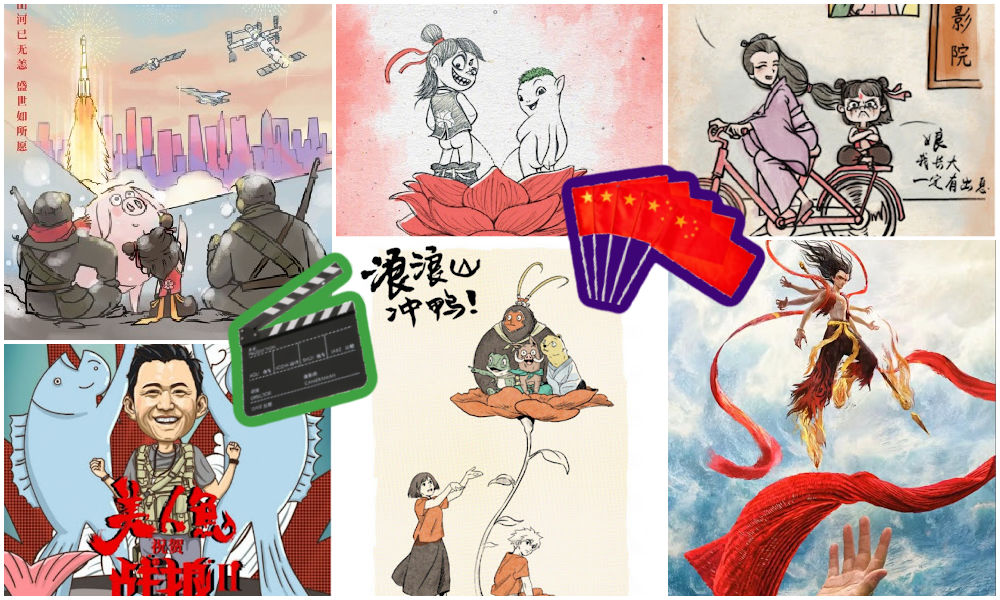
When one film breaks a record in China, the previous champion often celebrates with a playful and creative congratulatory poster. It’s a uniquely Chinese mix of solidarity, box-office success, and internet culture.
China’s 2025 summer box office season has been a success, surpassing 10 billion yuan (~US$1.4 billion), driven by record-breaking domestic films that have also made waves on Chinese social media.
Somewhat unexpectedly, the Chinese 2D animated feature Nobody (浪浪山小妖怪) has emerged as the season’s breakout hit.
On August 11, Nobody overtook the total earnings of the 2016 hit Big Fish & Begonia (大鱼海棠), also a domestically produced animation, becoming the highest-grossing domestic 2D animated film in Chinese history.
In keeping with industry tradition, Big Fish & Begonia celebrated the milestone by releasing a congratulatory poster on its official Weibo account.
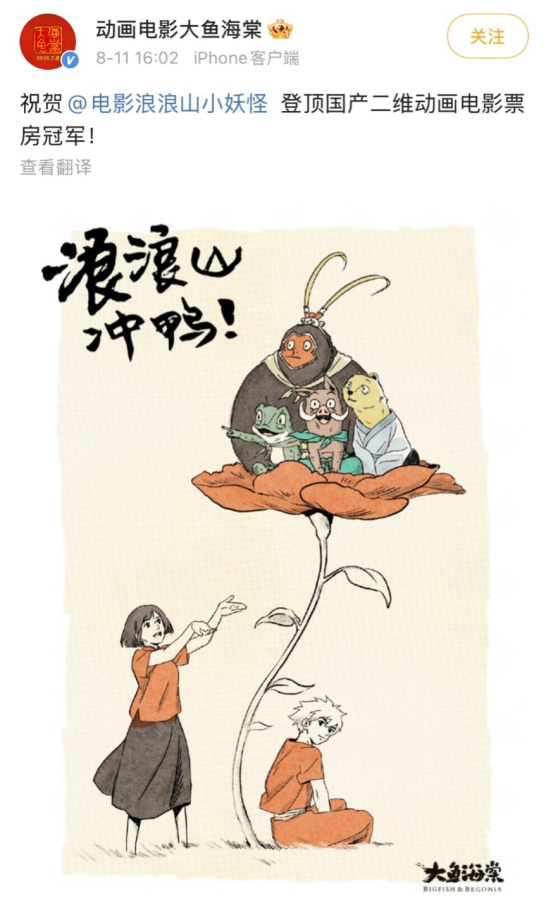
The poster shows the quirky characters of Nobody sitting on top of a giant red flower, while the protagonists of Big Fish & Begonia cheer them on from below. Written in bold calligraphy (“浪浪山冲鸭!”) is a playful phrase to cheer the movie on (translatable as: “Go, Langlang Mountain!” [Langlang Mountain is the original Chinese title.])
This is a unique “tradition” in China’s film industry: whenever a movie breaks a box-office record—no matter the category—the previous record-holder pays tribute by releasing a specially designed “congratulatory poster” in a gesture of camaraderie.
These posters are usually shared through the official Weibo accounts of the former champions, as it is common for Chinese film and TV drama productions to have their own accounts on Weibo.
Origins of the Poster Relay in China
The tradition of the so-called “box-office champion poster relay” (票房冠军海报接力) in China dates back to 2015, when Xu Zheng’s hit Lost in Thailand (泰囧)—which had held the record for highest-grossing domestic film since 2012 with a box office of 1.267 billion yuan (~US$200M)—was overtaken by Monster Hunt (捉妖记), which went on to gross 2.44 billion yuan (~US$340M).
Director Xu Zheng, who also starred in Lost in Thailand, took the initiative to release a humorous congratulatory poster for Monster Hunt. In the image, the little monster Huba (胡巴) is shown dancing on Xu’s bald head, accompanied by the text: “Lost in Thailand congratulates Monster Hunt on topping the Chinese box office.”
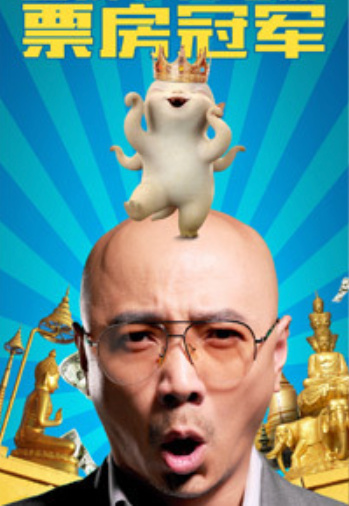
The poster that started a tradition.
Then, in 2016, Stephen Chow’s The Mermaid (美人鱼) surpassed Monster Hunt with a box office take of over 2.44 billion yuan (~US$340M). In response, the Monster Hunt team also released a congratulatory poster showing its main character Huba transformed into a mermaid, gazing up at the tail of The Mermaid.
The text on the poster reads: “Xing Ye (星爷) reaches the top, and Huba comes to congratulate him” — Xing Ye being Stephen Chow’s well-known nickname in Chinese. The vertical text on the right quoted lyrics from The Mermaid’s theme song: “You ask if this mountain is the highest in the world — there are always mountains higher than the other.”

Monster Hunt had been congratulated for its own win; now it was its turn to congratulate The Mermaid.
The relay continued in 2017 when Wolf Warrior 2 (战狼2) became the first Chinese film to cross the 5-billion-yuan mark (~US$700M), topping the chart. The Mermaid sent its congratulations with a poster featuring the Mermaid placing a crown on Wu Jing (吴京), the director and star of Wolf Warrior 2.

Caption: The Mermaid’s congratulatory poster for Wolf Warrior 2 in 2017. The text at the top reads: “When the nation is prosperous and the people are strong, the Mermaid shares in the honor.”
Beyond the Championship
Over time, the tradition expanded. Films that were overtaken in the rankings, even if it was not a change of the championship, also began releasing congratulatory posters.
In 2019, the animated sensation Ne Zha 1 (哪吒之魔童降世) surpassed a string of blockbusters, including Monster Hunt, Operation Red Sea (红海行动), and The Wandering Earth (流浪地球), to become the second-highest-grossing Chinese film at the time. Each of these films then sent their own tribute to “Little Nezha.”
A hand-drawn congratulatory poster by Xu Chengyi (许诚毅), the director of Monster Hunt, said: “We are all little monsters, free and easy together,” as a slight twist on Nezha’s classic line from the movie.
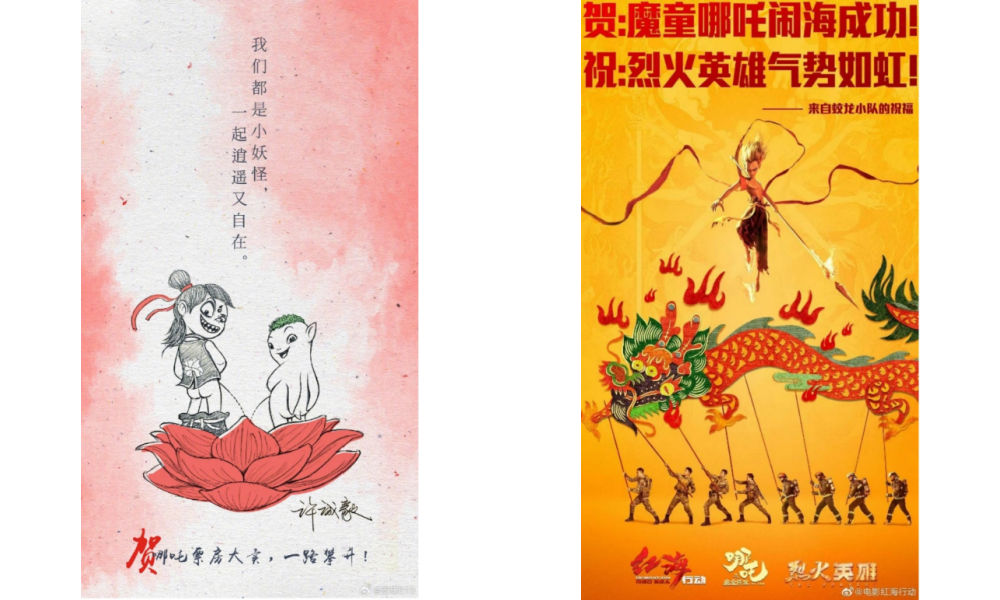
Congratulatory posters by Monster Hunt and Operation Red Sea to celebrate the success of Ne Zha in 2019.
The congratulatory poster by Operation Red Sea to Ne Zha 1 in 2019 also included a reference to The Bravest (烈火英雄), another film from the same producer, Bona Film Group, released at the same time as Ne Zha 1. In doing so, Bona used the popularity of Ne Zha 1 to promote its own new film at the same time.
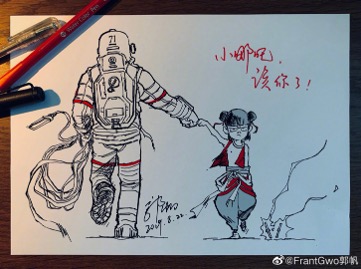
Congratulatory poster by Guo Fan(郭帆), director of The Wandering Earth.
In 2019, Guo Fan (郭帆), the director of The Wandering Earth (流浪地球), hand-drew a congratulatory poster for Ne Zha. The illustration featured playful artwork accompanied by the text: “Little Nezha, now it’s your turn!”
Ne Zha also set a milestone for Chinese animation in an international context, earning 1.834 billion yuan (~US$260M) within nine days and reclaiming the animated film box office record in China from Zootopia.
Coloroom Pictures, the producer of Ne Zha and other Chinese animated hits, marked the achievement with a poster that both celebrated the unity of China’s animation community and acknowledged the challenges that still lay ahead, writing: “Chinese animation has taken a big step forward, but it is still just starting out.”
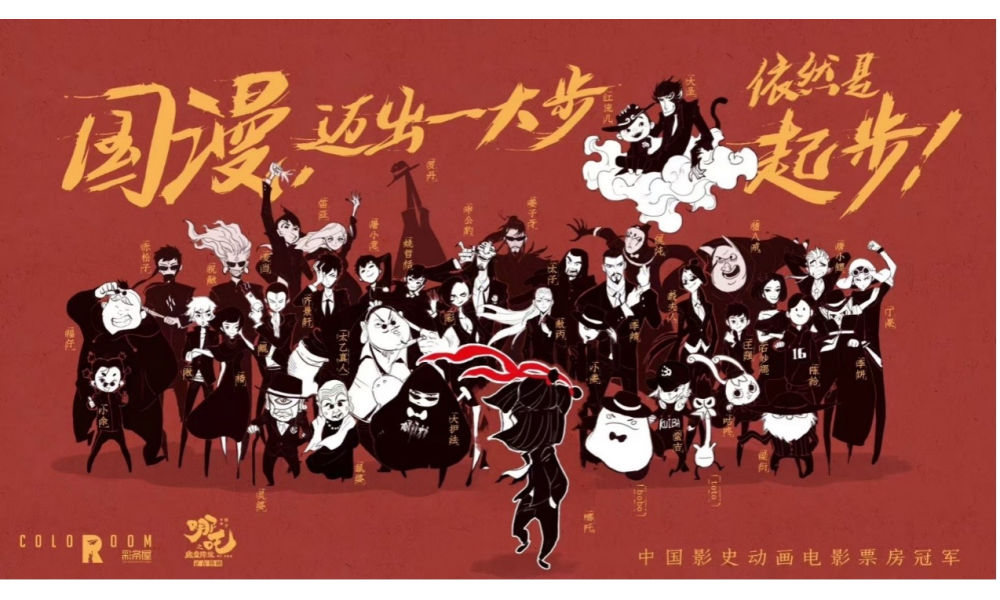
The poster features dozens of Chinese anime characters in formal dress, with Little Nezha standing in front of them and looking back.
These kinds of online congratulatory wishes, resonating with netizens, continued in 2021 when Hi, Mom (你好,李焕英) climbed to second place in China’s all-time box office.
Ne Zha 1 then released a hand-drawn poster showing Nezha sitting on the back of his mother’s bicycle, vowing to make something of himself—a promise fulfilled four years later when Ne Zha 2 actually surpassed Hi, Mom in early 2025.

Ne Zha 1’s congratulatory poster to Hi, Mom in 2021. The poster depicted a scene in front of Chentangguan Cinema where Hi, Mom is being shown, with Nezha sitting on the back seat of his mother’s bicycle (a classic scene in Hi, Mom’s promotion poster), vowing, “Mom, I will surely make something of myself when I grow up.”
In return, Hi, Mom published a poster in a matching style to response Ne Zha’s congratulatory poster in 2021.
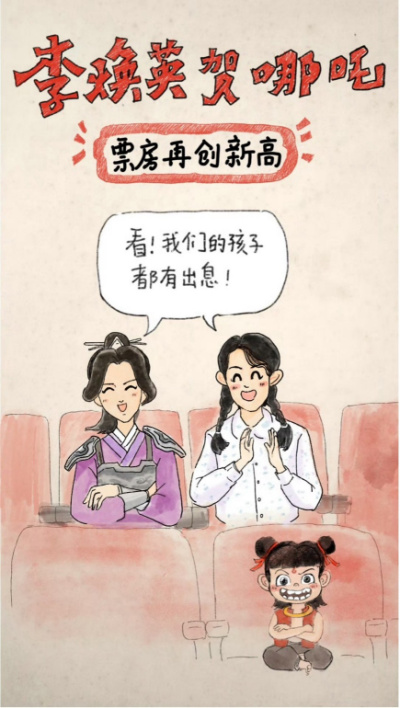
Hi, Mom’s congratulatory poster to Ne Zha 2 in 2025, in which Nezha’s mother and the mother from Hi, Mom sitting together and applauding for the success of Ne Zha 2, saying, “Look! Our children are all promising.”]
All these exchanges have created unexpected interactions between vastly different movie genres.
In November 2021, when the war epic The Battle at Lake Changjin (长津湖) surpassed Chinese animation feature Ne Zha 1, the congratulatory poster released by Ne Zha 1 depicted Nezha alongside volunteer army soldiers, gazing at rockets, fighter jets, and satellites.
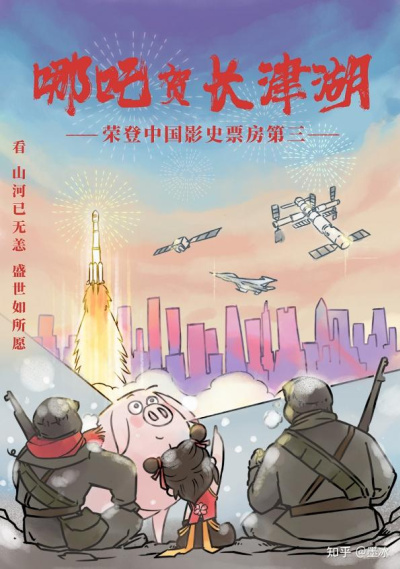
Ne Zha 1’s congratulatory poster to The Battle at Lake Changjin in 2021.
In 2025, when Ne Zha 2 seized the all-time box-office crown, The Battle at Lake Changjin also responded with a creative image.
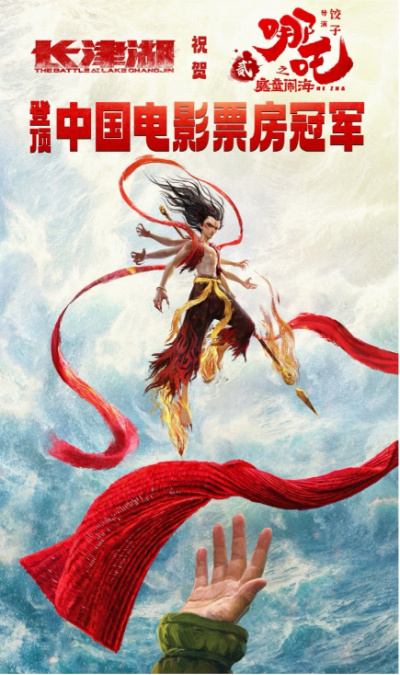
The Battle at Lake Changjin’s congratulatory poster to Ne Zha 2 in 2025.
In that image, Nezha’s magical weapon the Hun Tian Ling (混天绫) was ingeniously linked to the red scarf thrown to soldiers in The Battle at Lake Changjin. At the bottom, a soldier’s large hand is shown in a lifting gesture, holding Nezha up.
The concept of such a serious war movie interacting with a humorous animated film sparked some excitement among Chinese netizens at the time. They saw the exchange as a dialogue between traditional mythology and modern history, and as a symbol of the continuity and success of China’s film industry.
A Unique Chinese Tradition?
The custom of one film “passing on the torch” to the next hit film through a congratulatory message is not entirely unique to China. The practice can actually be traced back to Hollywood.
In 1977, when Star Wars dethroned Jaws at the North American box office, director Steven Spielberg congratulated George Lucas with a full-page ad in Variety, humorously depicting R2-D2 reeling in the great white shark.
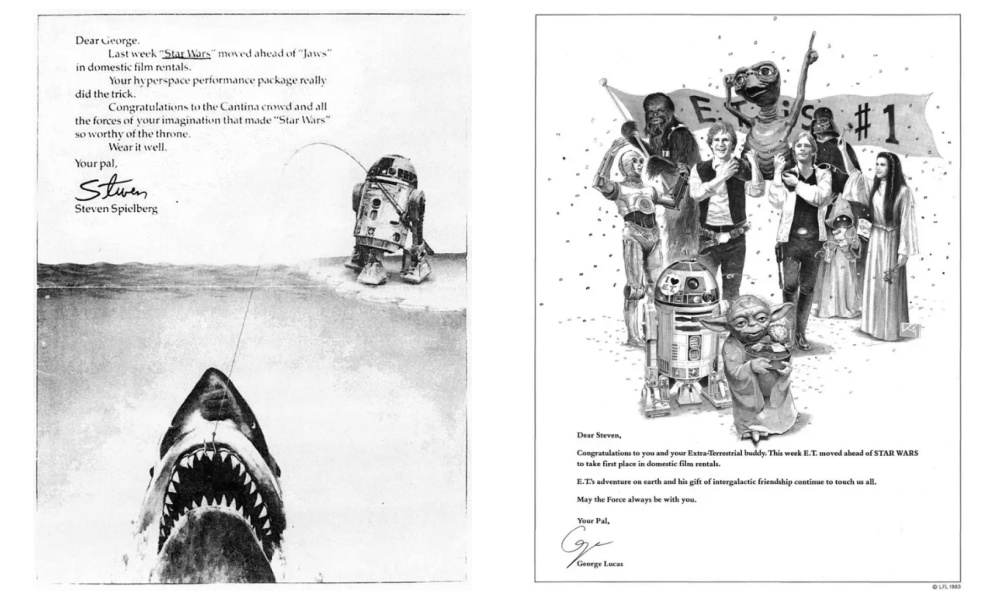
When Star Wars was dethroned by Titanic at the global box office in 1998, George Lucas sent a famous congratulatory message to James Cameron, again as a full-page ad in Variety.

Star Wars meets Titanic, famous congratulatory message to James Cameron .
In May 2019, when Avengers: Endgame officially overtook Titanic’s worldwide box office total to become the second-highest-grossing film of all time (behind Avatar), James Cameron — director of both Titanic (1997) and Avatar (2009) — posted a congratulatory image to salute Marvel Studios.
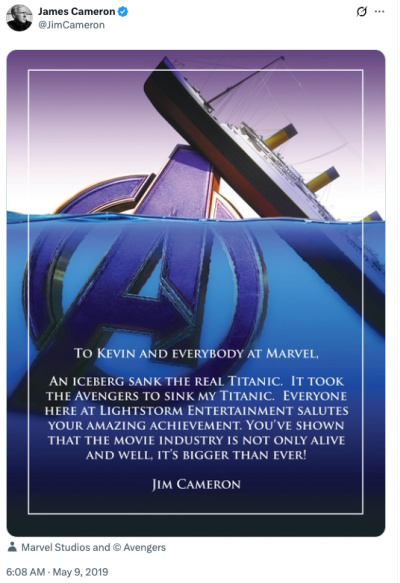
James Cameron on Twitter in May 2019.
So, although the practice of “passing the torch” among box office record-holders is not uniquely Chinese, the way it has developed in China is very distinct:
🔹 In Hollywood, box-office champions often hold the crown for years, and the ‘changing of the guards’ is relatively rare. In China, however, the industry has flourished mainly in the past decade, and records are broken far more frequently.
🔹 Social media has become central to promotion and marketing. Virtually all major Chinese films run active official accounts that not only post promotional material but also engage in playful interactions with other productions.
🔹 In Hollywood, congratulatory notes tend to come from individual directors, who salute each other as “friendly competitors.” In China, the messages are sent from the films’ official accounts, presenting it more as team-to-team recognition.
🔹 In that sense, it’s not just “movie versus movie,” but rather the Chinese film industry collectively measuring itself against Hollywood and other foreign hits. Each congratulatory poster is therefore not only a celebration of a new record, but also a statement of pride in the broader success of Chinese cinema.
🔹 Participation is not limited to the very top box-office leaders; other productions often join in, creating a ripple effect of collective celebration.
In China, the frequent turnover of box-office leaders combined with the creativity of these posters has turned the practice into a beloved feature of both film culture and the social media landscape.
In an earlier online poll, a majority of respondents described the tradition as “encouraging, and a demonstration of solidarity in China’s film industry.” Others called it a form of “romantic etiquette” unique to Chinese cinema.
Most importantly, it simply feels good — a win-win for both older and newer productions. As one netizen wrote after seeing the congratulatory artwork from Big Fish & Begonia’s official account: “I was inspired and hope that these little monsters can give everyone the courage to set out on their journeys, as well as the strength and passion to pursue their dreams. I hope domestic animation will keep getting better and better!”
By Wendy Huang
Edited by Manya Koetse
Spotted a mistake or want to add something? Please let us know in comments below or email us. Please note that your comment below will need to be manually approved if you’re a first-time poster here.
©2025 Whatsonweibo. All rights reserved. Do not reproduce our content without permission – you can contact us at
info@whatsonweibo.com
China ACG Culture
A Very Short Guide to China’s Most Popular Designer Toys
Published
2 months agoon
July 6, 2025
In our last article, we’ve determined how Wakuku’s rise is not just about copying & following in Labubu’s footsteps and more about how China is setting the pace for global pop culture IPs. I now want to give you a small peek into the main characters in the field that are currently relevant.
Even if these dolls aren’t really your thing, you’ll inevitably run into them and everything happening around them.
Before diving into the top trending characters, a quick word on the challenges ahead for Labubu & co:
🚩 Bloomberg Opinion columnist Shuli Ren recently argued that Labubu’s biggest threat isn’t competition from Wakuku or knockoffs like “Lafufu,” but the fragility of its resale ecosystem — particularly how POP MART balances supply, scarcity, and reseller control.
Scarcity is part of what makes Labubu feel premium. But if too many dolls go to scalpers, it alienates real fans. If scalpers can’t profit, Labubu risks losing its luxury edge. Managing this dynamic may be POP MART’s greatest long-term challenge.
🚩 Chinese Gen Z consumers value authenticity — and that’s something money can’t manufacture. If China’s booming IP toy industry prioritizes speed and profit over soul, the hype may die out at a certain point.
🚩 The same goes for storytelling. Characters need a solid universe to grow in. Labubu had years to build out its fantasy universe. Cute alone isn’t enough — characterless toys don’t leave a lasting impression and don’t resonate with consumers.

Examples of popularity rankings of Chinese IP toys on Xiaohongshu.
With that in mind… let’s meet the main players.
On platforms like Xiaohongshu, Douyin, and Weibo, users regularly rank the hottest collectible IPs. Based on those rankings, here’s a quick who’s-who of China’s current trend toy universe:

1. Labubu (拉布布)
Brand: POP MART
Creator: Kasing Lung
Year launched: 2015 (independent), 2019 with POP MART.
The undisputed icon of China’s trend toy world, Labubu is a mischievous Nordic forest troll with big eyes, nine pointy teeth, and bunny ears. Its quirky, ugly-cute design, endless possibilities of DIY costume changes, and viral celebrity endorsements have made it a must-have collectible and a global pop culture phenomenon.

2. Wakuku (哇库库)
Brand & Creator: Letsvan, backed by QuantaSing Group
Year launched: 2024 with first blind box
Wakuku, a “tribal jungle hunter” with a cheeky grin and unibrow, is seen as the rising star in China’s trend toy market. Wakuku’s rapid rise is fueled by celebrity marketing, pop-up launches, and its strong appeal among Gen Z, especially considering Wakuku is more affordable than Labubu.

3. Molly (茉莉)
Brand: POP MART
Designer: Kenny Wong (王信明)
Year launched: 2006 (creator concept); POP MART 2014, first blind boxes in 2016
Molly is a classic trend toy IP, one of POP MART’s favorites, with a massive fanbase and long-lasting popularity. The character was allegedly inspired by a chance encounter with a determined young kid at a charity fundraiser event, after which Kenny Wong created Molly as a blue-eyed girl with short hair, a bit of a temperament, and an iconic pouting expression that never leaves her face.

4. SKULLPANDA (骷髅熊猫)
Brand: POP MART
Creator: Chinese designer Xiong Miao
Year launched: 2018 (creator concept); POP MART 2020
Skullpanda is one of POP MART’s flagship IPs —it’s a goth-inspired fantasy design. According to POP MART, SKULLPANDA journeys through different worlds, taking on various personas and living out myriad lives. On this grand adventure, it’s on a quest to find its truest self and break new ground all while contemplating the shape of infinity.

5. Baby Zoraa
Brand: TNT SPACE
Creator: Wang Zequn, CEO of TNT SPACE
Year launched: 2022, same year as company launch
Baby Zoraa is cute yet devlish fierce and is one of the most popular IPs under TNT SPACE. Baby Zoraa is the sister of Boy Rayan, another popular character under the same brand. Baby Zoraa’s first blind box edition reached #1 on Tmall’s trend toy sales charts and sold over 500,000 units.

6. Dora (大表姐)
Brand: TNT SPACE
Year Launched: 2023
Dora is a cool, rebellious “big sister” figure, instantly recognizable for her bold attitude and expressive style. She’s a Gen Z favorite for her gender-fluid, empowering persona, and became a breakout sucess under TNT when it launched its bigger blind boxes in 2023.

7. Twinkle Twinkle [Star Man] (星星人)
Brand: POP MART
Creator: Illustrators Daxin and Ali
Year launched: In 2024 with POP MART
This character has recently skyrocketed in popularity as a “healing star character” inspired by how stars shine even in darkness. POP MART markets this character as being full of innocence and fantasy to provide some relaxation in this modern society full of busyness and pressure.

8. Hirono (小野)
Brand: POP MART
Creator: Lang
Year launched: In 2024 with POP MART
This freckled, perpetually grumpy boy has a wild spirit combining introversion and playful defiance. Hirono highlights the subtle fluctuations of life, its ups and downs, incorporating joy, sadness, fear, and more – a personification of profound human emotions.

9. Crybaby (哭娃)
Brand: POP MART
Creator: Thai artist Molly Yllom (aka Nisa “Mod” Srikamdee)
Year launched: 2017 (creator concept), 2023 POP MART launch
Like Wakuku, Crybaby suddenly went from a niche IP to a new hot trend toy in 2025. Together with Wakuku, it is called the “next Labubu.” Thai artist Molly Yllom created the character after the loss of her beloved dog. Crybaby is a symbol of emotional expression, particularly the idea that it’s okay to cry and express feelings.

10. Pouka Pouka (波卡波卡)
Brand: 52TOYS
Creator: Ma Xiaoben
Year launched: 2025
With its round, chubby face, squirrel cheeks, playful smile, and soft, comforting appearance, Pouka Pouka aims to evoke feelings of warmth, healing, and emotional comfort.
Other characters to watch: CiciLu, Panda Roll (胖哒幼), NANCI (囡茜), FARMER BOB (农夫鲍勃), Rayan, Ozai (哦崽), Lulu the Piggy (LuLu猪), Pucky (毕奇).
By Manya Koetse
(follow on X, LinkedIn, or Instagram)
Spotted a mistake or want to add something? Please let us know in comments below or email us. First-time commenters, please be patient – we will have to manually approve your comment before it appears.
©2025 Whatsonweibo. All rights reserved. Do not reproduce our content without permission – you can contact us at info@whatsonweibo.com.
Subscribe
What’s on Weibo is a reader-supported publication, run by Manya Koetse (@manyapan), offering independent analysis of social trends in China for over a decade. To receive new posts and support our work, consider becoming a paid subscriber.

Get in touch
Would you like to become a contributor, or do you have any tips or suggestions? Get in touch here!

Online Debates About China’s Train Traditions: No More Instant Noodles or Cigarette Breaks?

China Trend Watch: From Lhasa to Labubu

Dialogues Across Time: Remembering War in a New China

Passing the Torch from ‘Ne Zha’ to ‘Nobody’: China’s Box Office Poster Relay Tradition

The Rising Online Movement for Smoke-Free Public Spaces in China

Hidden Cameras and Taboo Topics: The Many Layers of the “Nanjing Sister Hong” Scandal

Inside the Labubu Craze and the Globalization of Chinese Designer Toys

“Jiangyou Bullying Incident”: From Online Outrage to Offline Protest

The Next Labubu: What the Rise of Wakuku Tells Us About China’s Collectible Toy Wave

A Very Short Guide to China’s Most Popular Designer Toys
Popular Reads
-

 China Memes & Viral1 month ago
China Memes & Viral1 month agoHidden Cameras and Taboo Topics: The Many Layers of the “Nanjing Sister Hong” Scandal
-

 China Books & Literature10 months ago
China Books & Literature10 months agoThe Price of Writing Smut: Inside China’s Crackdown on Erotic Fiction
-

 China Society11 months ago
China Society11 months agoDeath of Chinese Female Motorcycle Influencer ‘Shigao ProMax’ Sparks Debate on Risky Rides for Online Attention
-

 China Insight4 months ago
China Insight4 months agoUnderstanding the Dr. Xiao Medical Scandal



